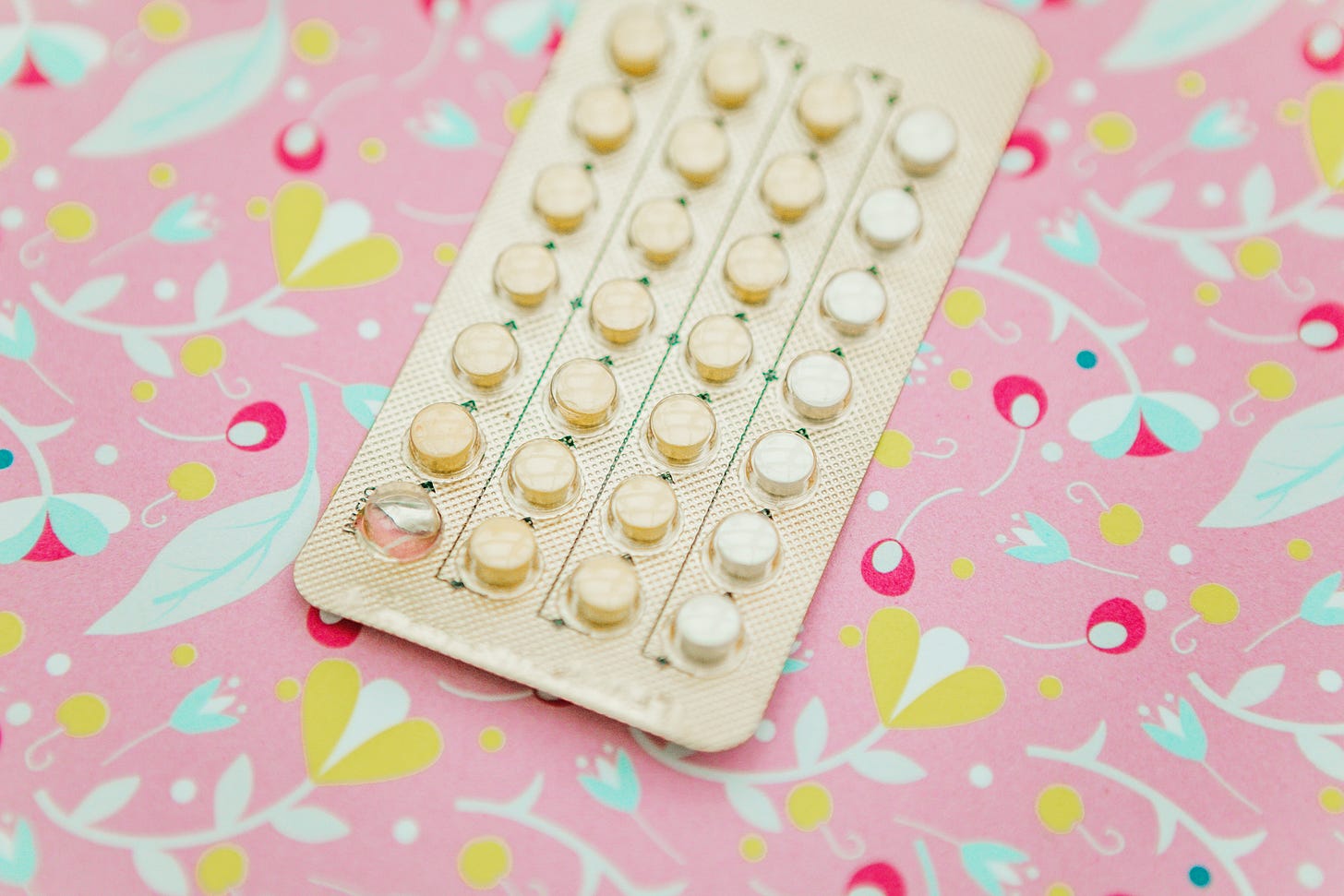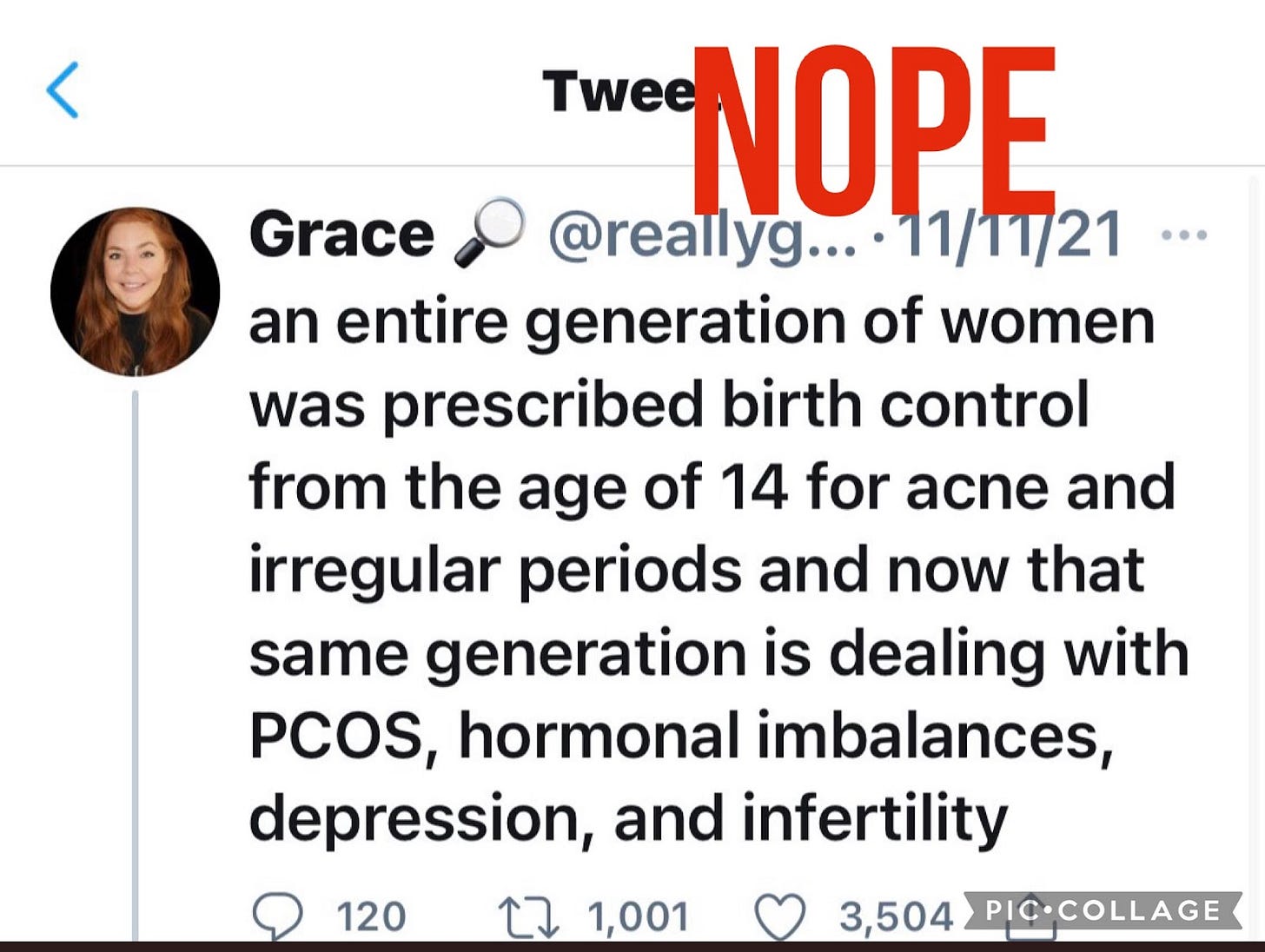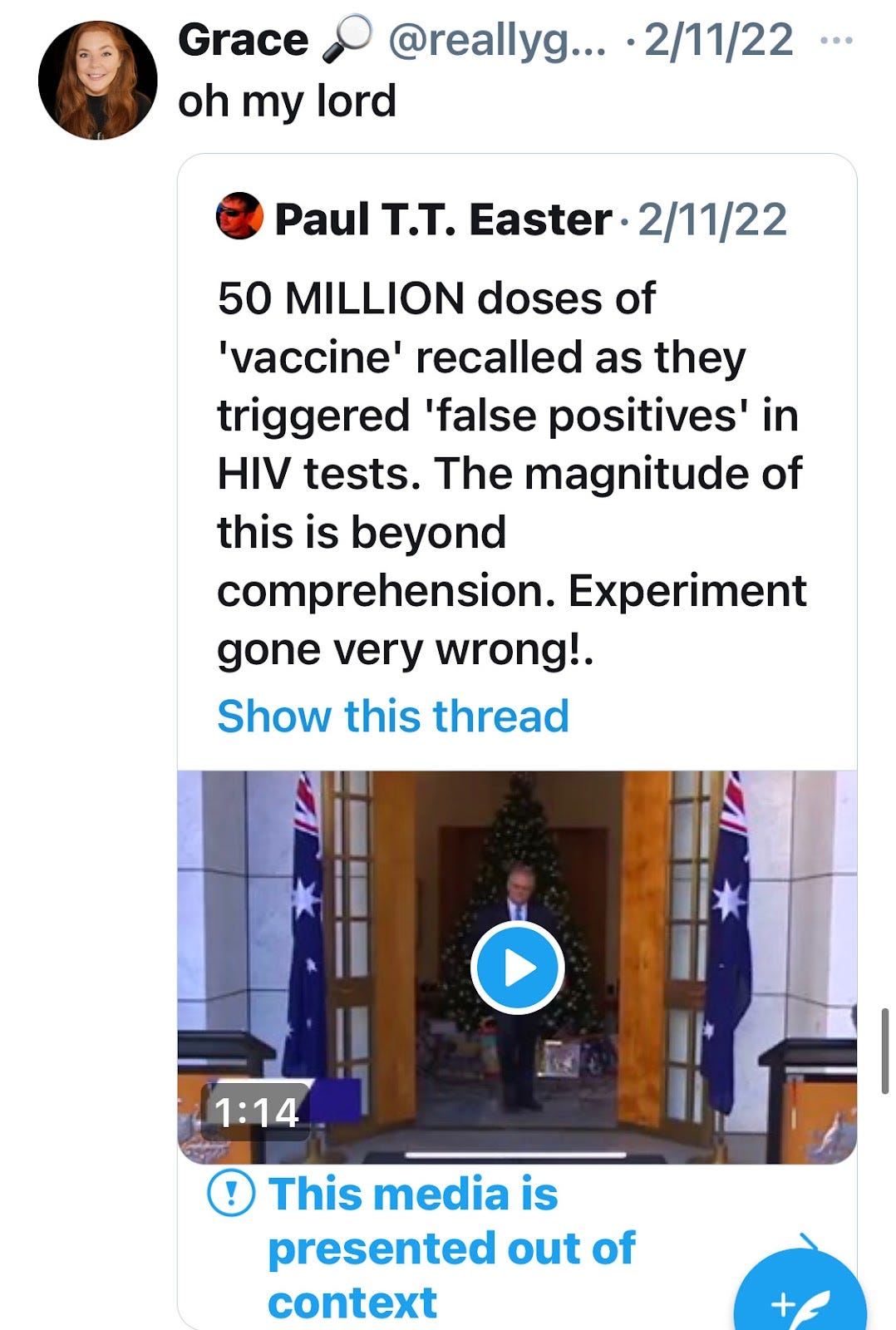The Birth Control Pill Does Not Cause PCOS
Disinformation about the pill is a cottage industry on Instagram
Last week I was tagged multiple times in posts on Instagram that were sharing this tweet. Here is the tweet with my editorial comment.
People who tweet that the COVID-19 vaccine is causing false positive tests for HIV are not to be relied upon for medical information. (That claim has been fact checked elsewhere as false).
Or who share this…
So I was shocked when I saw several health accounts that claim to support women’s health sharing this disinformation about the pill or promoting it.
We know the pill does not cause infertility. I have addressed that previously, and you can read about that here. How could they not know this? It is common medical knowledge. Lying to people about infertility is cruel.
The link with depression is very complex. Some women do report worsening mood on the pill, but some report benefit and for many with PMDD (premenstrual mood dysphoric disorder) it is a very useful therapy. It is complex and most certainly should not be distilled into content trolling for clicks and likes. If there is an impact with the pill, it is believed to cause depression for one out of 200 women. Is it something to look out for and be counseled about? Absolutely. However, this data does not mean that a generation of people have depression because of the pill. More studies are needed to see if specific people are at risk for pill-related depression. If you want to read more, I have addressed some of it here.
It is also important to note that feeling badly or moody on the pill is not the same as depression, and this may account for some of the differences between experiences and studies. Medications can affect how we feel for a variety of reasons, and if an individual feels unwell on a medication and it is safe to stop, then that is definitely an answer.
“Hormone imbalance” is a non medical term. Reproductive hormones (before menopause) are not in balance, they change constantly. Hormone imbalance is not a diagnosis, rather it is a bad analogy to describe some medical conditions. For example, some people describe PCOS as a hormone imbalance, but that is really a poor description. The birth control pill does not cause any endocrine condition characterized by abnormal levels of hormones.
On to the false claim about polycystic ovarian syndrome or PCOS, as I have seen this popping up a lot.
PCOS is the most common endocrine-metabolic disorder among reproductive aged women and people with ovaries. It is, according to Dr. Ricardo Azziz, an expert in the field, “a highly inherited, complex polygenic, multifactorial disorder.” In plain english this means that multiple genes are likely involved and what triggers these genes and the cascade of medical issues with PCOS isn’t entirely known. If an expert in the field who has spent years studying the topic doesn’t have a pithy summary about the cause, then a YouTuber who thinks the COVID-19 vaccine causes false positive HIV tests doesn’t have the inside scoop, ya know?
What is PCOS?
It is a condition associated with disturbances in ovulation, increased level of androgens (testosterones and other hormones like it), polycystic changes in the ovary, and insulin resistance and, depending on the criteria used, it affects approximately 5-20% of the population.
PCOS has likely been around for about 60,000 years
I mean that is really the kicker, right?
There are several genes that appear to play a role in PCOS, such as genes that affect the gonadotropin hormones (the hormones that stimulate the follicle to develop and that trigger ovulation), genes that control how the follicles develop, genes that impact insulin, and genes that affect ovarian growth. Once you know some of the genes that are involved you can do evolutionary detective work to see what groups of people have and don’t have these genes. This kind of research suggests the genetic variants associated with PCOS may be 60,000 years old.
The genetics of PCOS is very complex, meaning multiple genetic factors are involved and possibly environmental triggers, so we can’t yet predict who will and won’t get PCOS based on genetics alone.
PCOS has the same prevalence around the world
The prevalence of PCOS is the same where oral contraception is used more commonly and in countries where it is less popular.
The rate of PCOS in the United States has not changed since the 1990s, while the use of the pill has decreased
In 1988, 60% of sexually active women were using contraception, and among those using contraception, 31% were using the birth control pill. In 2016, 63.5% of women who were sexually active were using a method of contraception and 21% were using the pill. If the pill caused PCOS, rates should actually be going down. They are stable.
The rates of PCOS have not changed since the 1990s, we don’t have good data before that because standards for how to diagnose PCOS weren’t introduced until 1990.
It might seem like the rates are going up to some, but this is likely because there is a long history of under diagnosis and there is now a big push in medicine to get people diagnosed correctly. Some of this may also be due to the mistaken belief that PCOS is driven by obesity, and the rates of obesity are increasing, but the prevalence of PCOS is the same regardless of the rate of obesity in the population. As many people are now talking about their own PCOS, providing the illusion that it is more common.
The cause of PCOS isn’t known
We know many of the biochemical changes associated with PCOS. For example, there are abnormal levels of hormones called gonadotropins (released by the pituitary and that stimulate the follicle to develop and ovulate), there is insulin resistance, and there is ovulatory dysfunction (meaning the development of follicles and ovulation does not happen as it should). Why these changes occur is a complex mix of genetic and epigenetics (meaning how genes are turned “on” or “off”). To say there is a single root cause and that it is the birth control pill is simply false. But giving easy answers that “they” don’t want you to know is the core of all conspiracy theories.
Insulin resistance leads to elevated levels of insulin. This increases the production of androgens (hormones like testosterone) in the follicles and reduces the production of a carrier protein called sex hormone-binding globulin in the liver. SHBG carries most of the body’s testosterone and when testosterone is being carried it is inactive. Only the testosterone that is unbound is free to affect the tissues. So with PCOS there is both an increase in production of androgens, like testosterone, and there is a greater percentage of that testosterone that is free to act negatively on the body.
The birth control pill is part of every evidence-based treatment recommendation for PCOS.
We do not have a cure for PCOS, but the truth is we cure very few things in medicine. I appreciate that functional medicine doctors and naturopaths want you to believe that we don’t cure things because we are financially invested in you being unwell, but that is an interesting position from groups that typically promote unnecessary tests and expensive, untested supplements and diets.
There are many therapies for PCOS, and the recommendations depend on the goals but also on risks for other conditions associated with PCOS. Is the goal controlling irregular bleeding? Preventing cancer of the lining of the uterus? Treating acne? Reducing production of androgens? Removing unwanted hair growth? Improving metabolic status? Or getting pregnant? If contraception is desired, that is also important to know.
Oral contraception with estrogen suppresses the hormones from the pituitary (the gonadotropins mentioned previously). Remember, with PCOS levels of these hormones are abnormal. This suppression by the pill cannot cause PCOS. It does however lower the level of gonadotropins and halt ovulation, which reduces the production of androgens by the ovaries. The estrogen in the pill also increases production of SHBG, so the testosterone in the blood is more likely to be bound and hence inactive. This is a treatment because the high levels of androgens can cause acne, increased hair growth on the face and other areas, and hair loss on the scalp. No other therapy is as effective as estrogen containing birth control pills at reducing the high levels of androgens. The pill is not “masking PCOS”, it is treating the hormonal disturbance.
The birth control pill also controls irregular bleeding seen with PCOS and the progestin (the other hormone in the pill) is highly protective against cancer of the endometrium (lining of the uterus). Some people with PCOS are at higher risk of this cancer, so this kind of protection is important. Again, this isn’t “masking” PCOS, this is cancer prevention.
The one potential downside of the pill that is specific to PCOS is the possibility it might increase insulin resistance. The research here is not robust, and recent studies have not shown any significant negative effects on blood glucose, insulin, or weight gain, and if there were medically meaningful effects we should have seen it here. There can be a negative effect on lipids for people with PCOS, and so lipid and triglyceride levels should be monitored. If there are concerning lipid changes, the pill can be stopped and those changes will reverse.
There are of course other therapies for PCOS depending on the symptoms and treatment goals and other factors, but that is for another time.
All people with PCOS need to be watched more closely, metabolically speaking, whether they are on the pill or not
PCOS increases the risk of metabolic syndrome, cardiovascular disease, and diabetes, so once the diagnosis is made it is important to check lipid and cholesterol levels, waist circumference, blood pressure, and screen for diabetes with blood tests and then re screen periodically based on individual risk factors. Abnormal lipid profiles are especially common with PCOS.
Wanting to treat acne or irregular periods isn’t some silly reason to be on the pill
That’s clearly the implication with the original tweet and the implication of those who shared it. Acne causes depression and is associated with an increased risk of suicide. Why is that depression not important? The pill with estrogen is an excellent therapy for acne. If someone has acne that is resistant to topical therapy, why shouldn't they take the pill? The other alternative is long-term oral antibiotics or Accutane, both of which have risks. It’s not as if there are safe “herbal” therapies, supplements or effective diets for acne. Do those who promoted this tweet think a teen or really anyone with acne refractory to topical therapies who wants treatment should just suck it up?
And what about irregular periods? There is literally no other therapy to regulate periods other than hormones. What if a 14-year-old, or a 34-year-old for that matter, doesn’t want to soak their clothes every 3-4 months? What if they are afraid to go to school because they doesn’t know when their super soaker period is going to start? What if they are a surgeon and doesn’t want to flood their scrubs in the middle of a surgery, or really anyone who doesn’t want to flood their clothes or bleed unpredictably? Assuming there is no other cause and it’s just the awful periods, do the people liking and promoting posts about this tweet think people suffering with irregular and/or heavy periods should just tell their inner Goddess to snap out of it?
PCOS is an easy target for medical predators
Complex conditions are ripe for predators who are only too willing to make bold, unsubstantiated claims, and infertility, depression, and PCOS are all complex conditions. Whether this is to troll for clicks and followers or to get attention for untested smoothies, supplements and diets designed to “fix” so-called “problems” created by the pill, I really don’t know.
I know many people have been dismissed by their providers. I know many are sometimes quickly offered the pill for PCOS without a discussion about the goals of treatment or even a full explanation about PCOS itself. I also know people don’t always get the full range of therapies or a discussion of the benefits and risks of those therapies. That doesn’t make the pill a bad therapy, it means the provider did not listen and provide the care that was needed.
The answer to those very real problems is not found in incorrect, ignorant and overly simplified conspiracy theories about the pill that ignore the science and leave people less informed. The answer is also not found in untested therapies, which are best described as unregulated experiments.
Misinformation about any medication, including the pill, is harmful and that makes it misogyny. And it’s a cottage industry right now on Instagram.
References
Azziz R. Reproductive Endocrinology and Infertility: Clinical Expert Series. Polycystic Ovary Syndrome. Obstet Gynecol 2018;132:321–36)
Louwers YV, Stolk L, Uitterlinden AG, Laven JS. Cross-ethnic meta-analysis of genetic variants for polycystic ovary syndrome. J Clin Endocrinol Metab 2013;98:E2006–12.
Fessler DMT, Natterson-Horowitz B, Azziz R. Evolutionary determinants of polycystic ovary syndrome: part 2. Fertil Steril 2016;106:42–7.
Polycystic ovary syndrome. ACOG Practice Bulletin No. 194. American College of Obstetricians and Gynecologists. Obstet Gynecol 2018;131:e157–71.
Piccinino LJ, Mosher WD. Trends in Contraceptive Use In the United States: 1982-1995. Perspective on Sex and Reprod Health. Volume 30, Issue 1 January/February 1998.
Kavanaugh ML, Pliskin E. Use of contraception among reproductive-aged women in the United States, 2014 and 2016. Fertil Steril Reports. September 1, 2020. Volume 1, Issue 2.








What I don't get is why, after so many fucking decades, the pill is such a target for disinformation? It's not like it's a new and untried therapy. My only guess is that the perpetrators of the mis- and dis- information campaigns are misogynistic anti-abortion shitbags who would rather keep women barefoot, pregnant, and silent. It's especially appalling that so many of the misinformation purveyors are women. Thanks for the betrayal, sis.
Thank you, Jen!!!